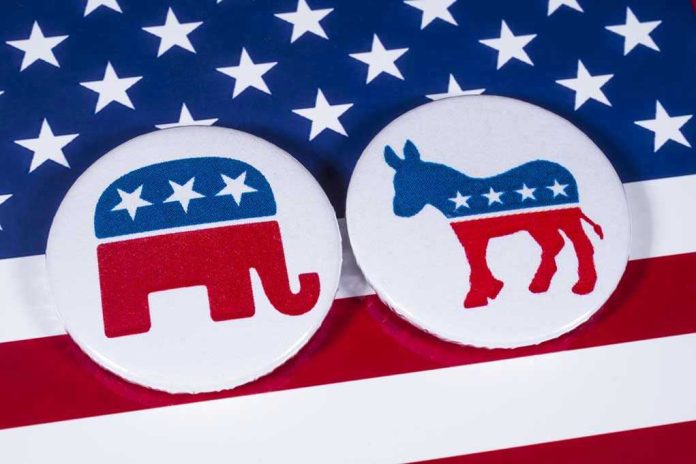
A non-citizen mayor just got accused of rigging his own election—after voters handed him a landslide win—and the story could change how small-town America checks who’s running their government.
Story Highlights
- Kansas mayor Jose Ceballos charged with fraud after winning reelection as a non-citizen.
- A new federal database flagged his status, exposing gaps in local election oversight.
- Ceballos will finish his current term but cannot serve another unless he becomes a U.S. citizen.
- The case spotlights the collision of immigration, election law, and local governance in the heartland.
Election Laws Collide With Local Realities in Small-Town Kansas
Jose Ceballos was no ordinary candidate. As mayor of Coldwater, Kansas, he’d already won the trust—and votes—of his neighbors. But the morning after his triumphant reelection, state authorities dropped a bombshell: Ceballos stood accused of casting ballots in multiple elections despite not being a U.S. citizen. The Kansas Attorney General’s office, armed with data from a new federal system, announced the charges, plunging the quiet farm town into a national debate over who really gets to hold the reins of power.
Federal law is clear: only citizens can vote in local, state, or federal elections. Yet Ceballos, a legal permanent resident, had slipped through the cracks since at least 2022, voting and running for office without raising alarms. The revelation didn’t come from routine vetting or city hall paperwork, but from a federal database cross-check that flagged his status after he’d already claimed an overwhelming 83% of ballots in his reelection. Suddenly, Coldwater’s mayor became the face of an explosive question: How did no one notice until now?
Legal Gray Zones and Local Power: Who Decides Who Stays?
The aftermath left Coldwater’s city council facing an uncomfortable calculus. Should they unseat a popular leader or let him serve out his term? The answer, at least for now, is a compromise: Ceballos will remain mayor until January 2026, but state law blocks him from being sworn in again unless he becomes a citizen. Meanwhile, the criminal case could send him to prison for more than five years if convicted. The city council’s hands are tied by legal limits, but their decision keeps the town’s government running while the courts sort out Ceballos’s fate.
Attorney General Kris Kobach, a national figure in election integrity circles, seized the moment to highlight what he calls systemic weaknesses. “The only way you can discover that a non-citizen is on the voter rolls is if some sort of external information comes to light,” he noted, underscoring the rarity—and the risk—of such cases. For Coldwater’s residents, the story is more personal: their votes, their mayor, their reputation now caught in a nationwide conversation about citizenship and trust in the system.
Non-Citizen Mayor Charged With Election Fraud One Day After His Reelection https://t.co/Qhmyckkhm6
— Mediaite (@Mediaite) November 6, 2025
Political Fallout and Policy Shifts: The Ripple Effect of One Mayor’s Case
The scandal triggered an immediate review of local election procedures—not just in Coldwater, but across Kansas. Election officials are scrutinizing how a non-citizen could register, vote, and lead a town for years without detection. Legal experts and political scientists argue that the Ceballos case could set a precedent: expect tighter checks on voter rolls, more reliance on federal databases, and possibly new laws clarifying eligibility for office at every level. The case’s timing—renewed calls for election security and national debates over immigration—means it’s likely to influence future policy in ways that reach far beyond a single prairie town.
For Ceballos, the consequences are personal and public. Legal jeopardy looms, citizenship is now his only ticket back into office, and his story becomes a cautionary tale for immigrants navigating the blurry line between civic participation and legal limits. For Coldwater, the incident means grappling with lost trust, potential leadership gaps, and the cost—both financial and reputational—of fixing a system that failed to catch the problem sooner.
Expert Opinions and the Future of Election Oversight
Election law specialists call the case nearly unprecedented, especially given Ceballos’s high-profile position. They emphasize that robust verification systems, not just routine paperwork, are essential to safeguard the process. Immigration scholars point out the unique challenges legal permanent residents face when engaging with their communities—sometimes unintentionally running afoul of complex rules.
National media and policy analysts agree: the Ceballos case will reshape how election eligibility is monitored, not just in Kansas but nationwide. Some call for more stringent checks; others warn against over-policing that could discourage legal residents from public service. For now, one thing is clear: Coldwater’s election drama is a wake-up call for any town that assumes “it can’t happen here.”
Sources:
Kansas Attorney General’s Office

